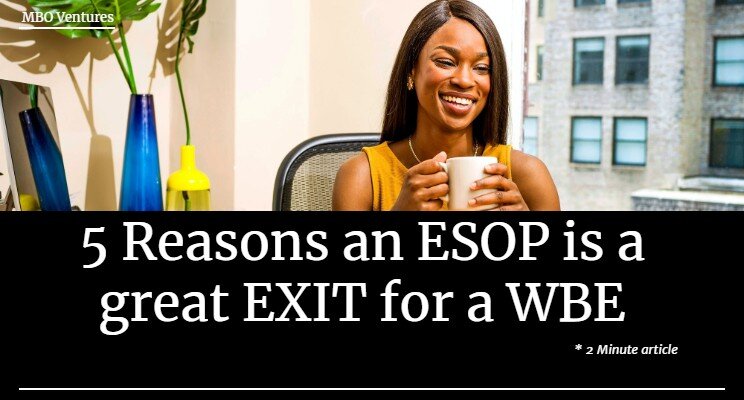If you own a female-owned-and-operated business, most likely you have applied for and received a WBE – Woman-owned Business Enterprise – certification. (If you haven’t done this, stop reading now and Google this.)
Why do women owned firms covet this certificate? With it, they have significantly more opportunities. WBE’s are eligible for numerous business contracts that competitors without the certification cannot receive. There are government contracts specifically earmarked for WBE certified businesses.
So… what happens when the female founder wants to sell or partially exit the WBE?
While WBE status is great for business, it can be risky when it is time to sell your company. This is why: If the company that buys you is not also WBE certified, you will lose your status and potentially many of your contracts that were specifically earmarked for a WBE enterprise.
However, You Can Sell Your Company To An ESOP Without Losing Your WBE Status(and get paid Fair Market Value)
Number one – you can easily sell up to 49% of your business to your employees via an ESOP. You don’t have to re-certify, or do anything special. This is a great method if you want to take some chips off the table, and continue to owning a majority of your company.
Number two – a woman owned business can now be sold 100% to their employees without losing their coveted WBE certification.
An ESOP will be certified as a WBE as long as the following conditions are met:
1. A woman holds the highest position in the company,
2. The board is controlled by women,
3. The day to day operations of the company are controlled by women,
4. 51 percent of the beneficial owners in the ESOP are women and
5. The ESOP trustee is a woman or a financial institution.
An ESOP is an alternative way to sell your company, where your employees take ownership.
Here’s how it works:
1. Similar to Private Equity, the company takes out a loan to pay the owner.
2. The owner pockets the proceeds and does not have to pay capital gains tax on it (deferred indefinitely).
3. The company will pay no taxes going forward.
4. The company pays down the debt rapidly.
5. The people that get the equity are your employees, not a third party.
6. You, as the owner, can continue to manage, or your management team will take over – your choice.
To learn more, go to www.mboventures.com or contact me, directly Darren Gleeman to learn more: dgleeman@mboventures.com

